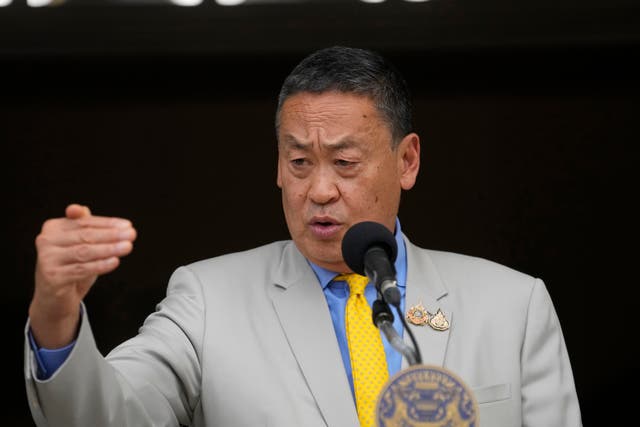Pheu Thai party leader to be nominated in vote for new Thailand PM
Srettha Thavisin was removed as prime minister by court order over an ethical violation on Wednesday.

Thailand’s populist Pheu Thai party has said it will nominate its leader Paetongtarn Shinawatra in a Parliament vote for the country’s new prime minister after former incumbent Srettha Thavisin was removed by a court order over an ethical violation.
Ms Paetongtarn is the youngest daughter of former prime minister Thaksin Shinawatra, who is seen as the force behind Pheu Thai.
He was the first Thai politician ever to win an overall majority of seats and the residual popularity of Mr Thaksin is a factor in the support for his daughter.
If Ms Paetongtarn is approved by Parliament’s vote, which is scheduled for Friday, she will become Thailand’s second female prime minister and the country’s third leader from the Shinwatra family after her father and her aunt Yingluck Shinawatra.

Pheu Thai was given support on Thursday by its major coalition partners to nominate one of its two candidates as the new prime minister.
The other eligible candidate for Pheu Thai had been Chaikasem Nitisiri, 75, a former minister of justice who served in the Pheu Thai government led by Mr Thaksin’s sister Ms Yingluck and was removed by a coup in 2014.
Mr Srettha was ousted on Wednesday after less than a year in office.
The Constitutional Court found him guilty of a serious ethical breach regarding his appointment of a Cabinet member who was jailed in connection with an alleged bribery attempt.
It was the second major ruling in a week to shake Thai politics.
The same court last week dissolved the progressive and main opposition Move Forward party, which won last year’s general election but was blocked from power, saying it violated the Constitution by proposing an amendment to a law against defaming the country’s royal family.
The party has already regrouped as the People’s Party.
Pheu Thai’s ruling coalition partners have already given their endorsement for the party’s candidate, including the Bhumjaithai party, which came third in the election, and the pro-military Phalang Pracharath and United Thai Nation parties.

Pheu Thai finished second in last year’s election but was given a chance to form a government after the winners, reformist Move Forward party, was blocked from taking power by the previous Senate, a military-appointed body.
Move Forward was then excluded from the coalition by Pheu Thai, who went on to join hands with parties affiliated with the previous military-backed government that ousted it in a coup.
The move drew criticism from some of its supporters but party officials say that it was necessary to break the deadlock and start reconciliation after decades of deep political divisions.
The former senators were given special power to veto a prime ministerial candidate by the constitution adopted in 2017 under a military government.
That power expired when their term ended in May, however. New members of the Senate, selected in a convoluted process last month, do not retain the veto.
A candidate now needs just a majority from the lower house, or at least 247 votes.
The House of Representatives now has 493 sitting members after six were banned from politics as a result of Move Forward’s dissolution.
Another lawmaker of the Bhumjaithai party is suspended awaiting a court ruling.





